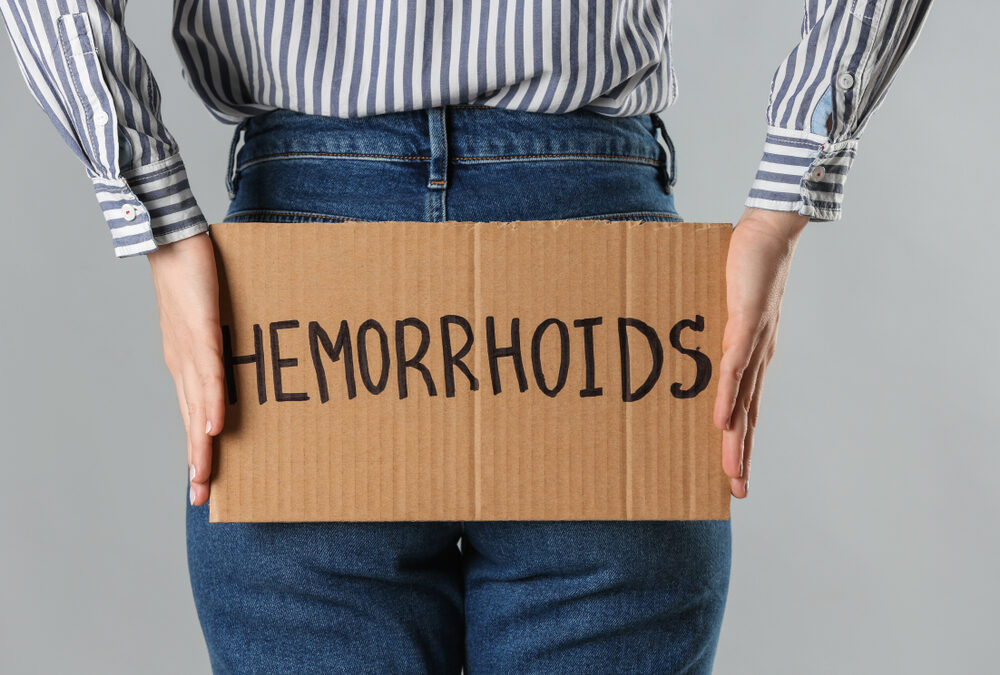If you suffer from extremely itchy and painful hemorrhoids, then you might try as many over-the-counter treatments as you can to ease your symptoms. But even with the best products available, the pain caused by your hemorrhoids can still plague you. You’ll need professional medical help to find relief from your burning pain.
Here are some possible reasons for your painful hemorrhoids and what you can do to relieve them.
Why Do You Have Hemorrhoids?
Hemorrhoids develop when the small veins in the lower portion of your rectum or around the opening of your anus become swollen and inflamed. The increased pressure in the veins presses and irritates the nerves in this area, causing discomfort.
Hemorrhoids that develop inside the rectum are called internal hemorrhoids. Those that affect the veins around the outside of your anus are called external hemorrhoids.
Do Internal Hemorrhoids Hurt More?
Internal hemorrhoids tend to cause less pain and discomfort than external hemorrhoids because there are fewer nerves that sense pain inside of the rectum.
Because external hemorrhoids sit on the outside of the body, they are more exposed to irritation and damage. External hemorrhoids can develop an intense itch, or they can hurt if you accidentally wipe or scratch them. Your skin also has more pain-sensitive nerves, and so external hemorrhoids are more likely to be irritated. With that being said, you may notice that internal hemorrhoids usually hurt when passing stool.
Although it isn’t completely or exactly clear as to why internal and external hemorrhoids develop, experts believe that different factors make you susceptible to hemorrhoids, including these below.
Placing Extensive Pressure on Your Veins
One of the possible causes of hemorrhoids is pressure. Veins carry blood away from your organs and back to your heart. Placing too much pressure on the veins suppresses (squeezes) them until they can’t transport blood properly. The blood eventually pools inside the veins, which causes them to swell. This process is very similar to how varicose veins develop.
Several things can cause pressure on your rectum and anus, including prolonged sitting and heavy lifting. You can remedy these issues by standing up and stretching your body throughout the day, or by using special equipment to help you move heavy objects at work.
If you do not take care of your veins, it can lead to a condition called deep vein thrombosis (DVT), where the pooled blood clots in the veins. If a blood clot forms inside of a hemorrhoid, it becomes known as a thrombosed hemorrhoid. These are particularly painful and require professional treatment and surgery.
Experiencing Chronic Constipation
Constipation occurs when your bowel movements become hard or rock-like due to dehydration or another cause. Constipation forces you to push harder and strain longer to empty your bowels. The strain placed on the blood vessels in your rectum or anus can irritate or inflame them over time.
Constipated bowel movements can also become large enough to tear the tissues of your rectum and anus. Some adults develop anal fissures or tears in the lining of the anus. Most of the time, an anal fissure will heal on its own within a few weeks. However, fissures can be more problematic if they occur at the same time as hemorrhoids.
Anal fissures also can be very painful if they don’t heal properly. Because hemorrhoids and constipation can both cause bleeding, pain, and tenderness in the rectum and anus, it’s important to find an effective treatment for both conditions. A board-certified general surgeon can perform hemorrhoid surgery to remove hemorrhoids and perform anal fissure repair.
Symptoms of Hemorrhoids
Although it doesn’t occur with everyone who has hemorrhoids, some people can experience itchiness and bleeding. The symptoms may be worse in people who have external hemorrhoids. One usual symptom of hemorrhoids is rectal bleeding.
Other symptoms include pain and swelling around the anus, as well as itching, or painful lumps. If you notice any of these symptoms, talk with your doctor.
What Doctor do you see for Hemorrhoids?

The answer to this question is first, see your regular doctor. Depending on the severity of your symptoms, your primary care physician will refer you to an appropriate specialist. Doctors who treat hemorrhoids typically specialize in digestive, colon, or rectal surgery.
During your doctor’s appointment, a physician will generally question you about your diet and daily habits. Sometimes, changing your diet can help keep swollen blood vessels and constipation away. Some adults relieve their symptoms with fiber. However, a doctor will go over the best types of food to add to your diet during your appointment.
After a doctor completes your verbal exam, they’ll perform a rectal exam on you. Your rectal exam may occur visually, manually, and diagnostically. A visual exam allows a physician to examine the condition of your anus. Then, a manual exam allows a doctor to detect the precise location and size of your hemorrhoids.
The diagnostic portion of your rectal exam allows a doctor to look inside your body to see if you have any other health problems to address or treat, such as polyps and ulcers. These conditions can also cause rectal and anal bleeding in some people. Although hemorrhoids are serious problems, polyps and ulcers can be signs of cancer or disease, so it’s important to have a thorough exam.
What Treatments are there for Low-Grade Hemorrhoids?
The severity of hemorrhoids is rated in four stages. Some doctors may recommend sclerotherapy for stages one and two. Typically, sclerotherapy is a treatment that closes varicose and spider veins.
During a sclero treatment, the doctor injects a saline-based medicine that breaks down the vein walls and causes them to disappear. Sclerotherapy can help reduce pain and swelling around the hemorrhoids, however, sclero treatments usually require multiple visits in order to be totally effective.
Another treatment is rubber band ligation. During this procedure, your surgeon will tie off the swollen veins with small rubber bands, which cause the veins to die. Any blood flow will be redirected and reabsorbed back into your body.
Rubber band ligation is better suited for early-stage hemorrhoid problems. This procedure can be used for later-stage cases, but the operation would require general anesthesia.
Finally, surgeons do offer infrared coagulation hemorrhoid treatments. For this treatment, your surgeon will use infrared light to heat and irritate the hemorrhoid and break it down. This procedure can be performed on external hemorrhoids.
How Do You Treat Severe Hemorrhoids?
Once a physician finishes your exam, they’ll begin planning your treatment. If your hemorrhoids are too severe, a doctor may surgically remove them with a hemorrhoidectomy. This type of surgery may require you to follow certain protocols, such as not eating or taking specific medications before your procedure.
Some doctors use surgery to shrink large or protruding hemorrhoids by cutting off the blood supply to them. The veins will die or shrivel up inside the rectum or around the anus. If you have questions about this procedure or another treatment option, consult with a doctor or provider immediately.
How can I treat hemorrhoids at home?
Although it’s essential that you see a doctor about your hemorrhoids and possible constipation, you can relieve your symptoms temporarily at home. For example, you can try softening up your small and large intestines by sipping on water during the day. Unsweetened tea is another option you might like.
Fiber supplements may also help soften stools and reduce pain during bowel movements. Your doctor may also prescribe using a sitz bath to relieve pain before and after surgical treatment. Alternatively, taking a warm bath and adding Epsom salt can be very healing.
How can I prevent hemorrhoids?
As we have mentioned, taking fiber, staying hydrated, and avoiding physical strain are all ways to reduce the risk of hemorrhoids. Also, the National Institute of Diabetes and Digestive and Kidney Diseases recommends that people should avoid straining during bowel movements, and spend less time sitting on the toilet.
To learn more about this condition or to find treatment, book an appointment online today at one of our conveniently located offices. If you have problems selecting an office to visit, contact The Surgical Clinic directly. Our staff will gladly help you find the right appointment and office to visit.
Hemorrhoid Surgeons in Nashville, TN
- Chad M. Moss, MD, Columbia Clinic
- Brian Kendrick, MD, Columbia Clinic
- Mark S. Hinson, MD, FACS, Columbia Clinic
- A. Brent Fruin, MD, Summit Clinic, Mt. Juliet Clinic
- John A. Boskind, MD, FACS, Summit Clinic, Mt. Juliet Clinic
- K. Tyson Thomas, MD, FACS, St. Thomas West
Nashville General Surgeons at The Surgical Clinic
Suhail Allos, MD
General Surgeon
John A. Boskind, MD, FACS
General Surgeon
Patrick T. Davis, MD, FACS
General Surgeon & Bariatrics
Brent A. Fruin, MD
General Surgeon
Andrew W. Garrett, MD
General Surgeon
Trudie A. Goers, MD, FACS
General Surgeon
Bassam Helou, MD
General Surgeon
Mark S. Hinson, MD, FACS
General Surgeon
George B. Lynch, MD, FACS
General Surgeon & Bariatrics
Clinton A. Marlar, MD
General Surgeon
James G. McDowell, MD, FACS
General Surgeon & Bariatrics
Willie V. Melvin III, MD, FACS
General & Robotic Surgeon
Chad M. Moss, MD, FACS
General Surgeon
Drew H. Reynolds, MD
General Surgeon
Joshua T. Taylor, MD, FACS
General & Robotic Surgeon
K. Tyson Thomas, MD, FACS
General Surgeon
J. Tyler Watson, MD
Minimally Invasive & Robotic General Surgeon
General surgeons in Greater Nashville

Dr. John Boskind
General Surgeon
SUMMIT

Dr. Mariana Chavez
General Surgeon
Downtown

Dr. Patrick Davis
General Surgeon
SOUTHERN HILLS

Dr. Gretchen Edwards
General Surgeon
DOWNTOWN

Dr. Alex Fruin
General Surgeon
SUMMIT

Dr. James Griscom
General Surgeon
NASHVILLE

Dr. Mark Hinson
General Surgeon
COLUMBIA

Dr. George Lynch
General Surgeon
NASHVILLE

Dr. Clinton Marlar
General Surgeon
SKYLINE

Dr. Willie Melvin
General Surgeon
SMYRNA

Dr. Chad Moss
General Surgeon
COLUMBIA

Dr. William Polk
General Surgeon
NASHVILLE

Dr. Drew Reynolds
General Surgeon
ST. THOMAS WEST

Dr. Joshua Taylor
General Surgeon
SMYRNA

Dr. Davidson Oxley
General Surgeon
COLUMBIA

Dr. Tyson Thomas
General Surgeon
ST. THOMAS WEST

Dr. John Valentine
General Surgeon
HENDERSONVILLE

Dr. Patrick Wolf
General Surgeon
ST. THOMAS WOLF


